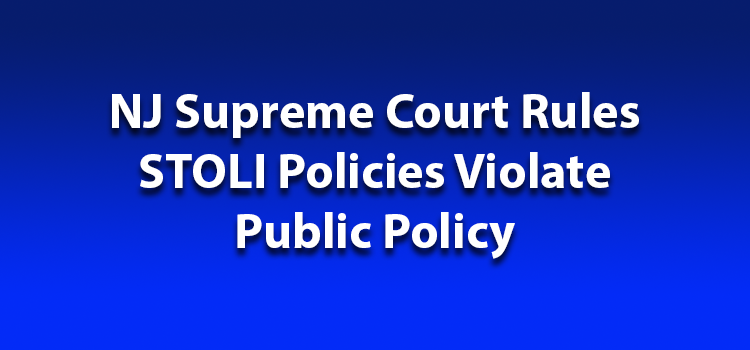In Sun Life Assurance Company of Canada v. Wells Fargo Bank, N.A., (A-49-17/080669) (Decided June 4, 2019), the Supreme Court of New Jersey held that Stranger-Originated Life Insurance (STOLI) policies violate public policy and are void at the outset. The court further held that a party may be entitled to a refund of premium payments it made on such a policy, depending on the circumstances.

Facts of Sun Life Assurance Company of Canada v. Wells Fargo Bank, N.A
In April 2007, Sun Life Assurance Company of Canada received an application for a $5 million insurance policy on the life of Nancy Bergman. The application listed a trust as the sole owner and beneficiary of the policy. Ms. Bergman’s grandson signed as trustee. The other members of the trust were all investors, and all strangers to Ms. Bergman. The investors paid most if not all of the policy’s premiums.
Sun Life received an inspection report that listed Ms. Bergman’s annual income as more than $600,000 and her overall net worth at $9.235 million. In reality, her income was about $3000 a month, and her estate was later valued at between $100,000 and $250,000. Although Ms. Bergman represented that she had no other life insurance policies, five policies were taken out on her life in 2007, for a total of $37 million.
Sun Life issued the policy on July 13, 2007. At the time, the trust was the sole owner and beneficiary. The policy had an incontestability clause that barred Sun Life from challenging the policy — other than for non-payment of premiums — after it had been “in force during the lifetime of the Insured” for two years. About five weeks after the policy was issued, the grandson resigned as trustee and appointed the investors as successor co-trustees. The trust agreement was amended so that most of the policy’s benefits would go to the investors, who were also empowered to sell the policy.
More than two years later, the trust sold the policy, and the investors received nearly all of the proceeds from the sale. Wells Fargo Bank, N.A. eventually obtained the policy in a bankruptcy settlement and continued to pay the premiums.
After Nancy Bergman passed away in 2014, Wells Fargo sought to collect the policy’s death benefit. Sun Life investigated the claim, uncovered the discrepancies noted above, and declined to pay. Instead, Sun Life sought a declaratory judgment that the policy was void ab initio (from the beginning). Wells Fargo counterclaimed for breach of contract and sought the policy’s $5 million face value; if the court voided the policy, Wells Fargo sought a refund of the premiums it paid.
The District Court partially granted Sun Life’s motion for summary judgment. After first concluding that New Jersey law applied, the court held “that this was a STOLI [(stranger-originated life insurance)] transaction lacking insurable interest in violation of [the State’s] public policy. . . . As such, it should be declared void ab initio.” The court also granted Wells Fargo’s motion to recover its premium payments, reasoning that “Wells Fargo is not to blame for the fraud here” and that “[a]llowing Sun Life to retain the premiums would be a windfall to the company.”
Both parties appealed. Finding no dispositive New Jersey case law, the Third Circuit Court of Appeals certified two questions of law to the New Jersey Supreme Court:
- Does a life insurance policy that is procured with the intent to benefit persons without an insurable interest in the life of the insured violate the public policy of New Jersey, and if so, is that policy void ab initio?
- If such a policy is void ab initio, is a later purchaser of the policy, who was not involved in the illegal conduct, entitled to a refund of any premium payments that they made on the policy?
Court’s Decision in Sun Life Assurance Company of Canada v. Wells Fargo Bank, N.A.
The New Jersey Supreme Court answered both questions in the affirmative.
The court first held that a life insurance policy procured with the intent to benefit persons without an insurable interest in the life of the insured does violate the public policy of New Jersey. Moreover, such a policy is void at the outset.
“We find that STOLI policies run afoul of New Jersey’s insurable interest requirement and are against public policy. It would elevate form over substance to conclude that feigned compliance with the insurable interest statute — as technically exists at the outset of a STOLI transaction — satisfies the law,” Chief Justice Stuart Rabner wrote. “Such an approach would upend the very protections the statute was designed to confer and would effectively allow strangers to wager on human lives.”
The New Jersey Supreme Court further held that a party may be entitled to a refund of premium payments it made on the policy, depending on the circumstances. “Among other relevant factors, courts should consider a later purchaser’s participation in and knowledge of the original illicit scheme,” Chief Justice Rabner wrote.
